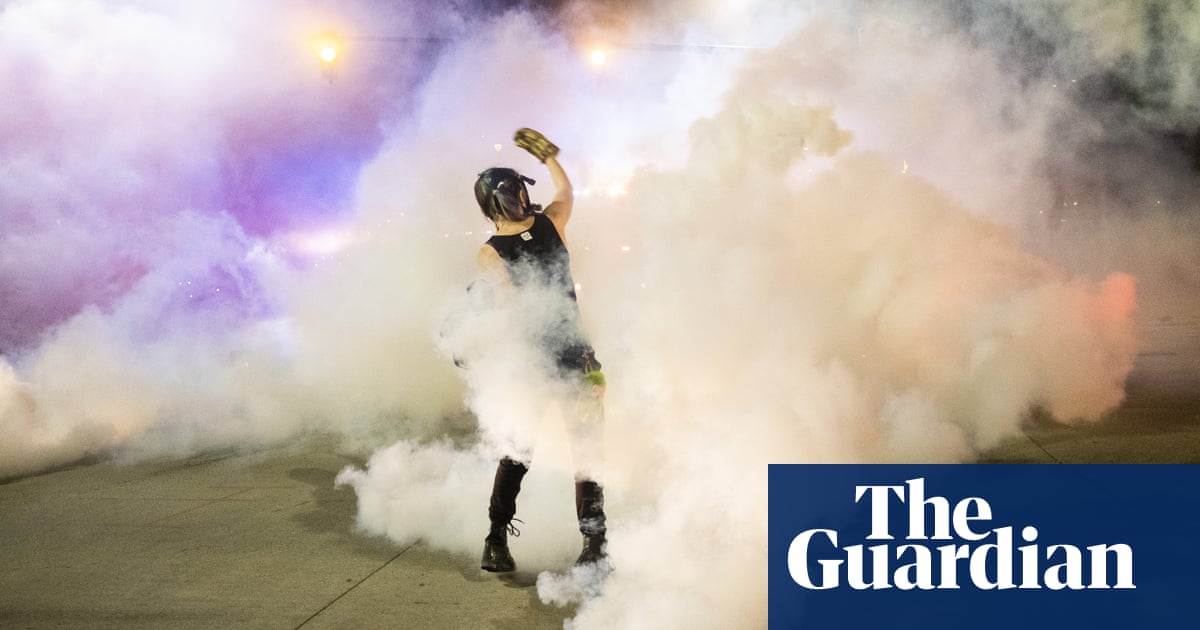
Protests have erupted across the US, from coast to coast and north to south, in reaction to the killing of George Floyd, an African American man in Minneapolis who died under the knee of a white police officer last Monday.
Major cities from New York to Los Angeles and Miami to Seattle have seen a mix of peaceful demonstrations and violent outbreaks. Dozens of smaller cities also witnessed protests and fierce unrest.
Under a hardline president gambling all to win re-election, the US is struggling to contain anger over yet another killing of a black American by law enforcement officers while under a coronavirus pandemic that has killed nearly 104,000 and cratered the economy, exposing stark inequality.
Cities that became hotspots of unrest on Saturday night include:
Minneapolis
The intersection where George Floyd died is a mass of flowers and chalked tributes and hundreds have marched peacefully in his name. But riots have broken out nearby too. The police precinct of the officers who detained Floyd has been burnt out. On Saturday night, crowds breaking curfew were met by massed state troops who overwhelmed them with tear gas, flash bombs and rubber bullets. Many locals barricaded businesses against looting and arson.
New York
Demonstrators marched across the Manhattan Bridge, which connects downtown Manhattan to Brooklyn on Saturday night. Thousands marched during the day in neighborhoods ranging from Harlem and the East Village to Flatbush and downtown Brooklyn, demanding an end to police brutality. Incidents involving Molotov cocktails and police vehicles driving into demonstrators were being investigated.
Los Angeles
A state of emergency was declared late on Saturday as two days of discord escalated with looting and vandalism. The authorities expressed support for peaceful protest but struggled to control eruptions of violence. Marchers in Beverley Hills chanted: “Eat the rich.”
Miami
As curfew was lifted on Sunday morning, lines of police officers with helmets and shields were guarding police headquarters. Evidence of unrest ranged from “system broken” spray-painted on a wall to carpets of broken glass and a burned-out squad car. Local media reported “passionate crowds” in other Florida cities such as Tampa, Tallahassee, Coral Gables and Orlando, chanting, “No justice, no peace”.
Nashville
Organizers of an “I will breathe” rally against police mistreatment slammed those who veered from powerful protests in a park to chaotic nighttime marching that resulted in pockets of rioting and fires at the courthouse and City Hall. National guard troops were called in and violent confrontation ensued.
Salt Lake City
The capital of conservative Utah is not known as hotbed of unrest but a protest denouncing racism and deadly force by law enforcement turned violent on Saturday as protesters set cars on fire and threw rocks at businesses. Police responded with rubber bullets and arrests, the Salt Lake Tribune reported, adding that earlier, hundreds peacefully marched from the police department to the capitol.
Cleveland
Curfew is mandated from Sunday afternoon until 8am Monday morning after what started as a demonstration where people wore masks against the coronavirus and distributed hand-sanitizer, food and water, escalated and businesses were smashed up. Ohio governor Mike DeWine leaned on state and federal help and pledged to “bring to justice those whose lawlessness escalated an otherwise peaceful protest to a riot”. Other Ohio cities, Cincinnati and Columbus, also experienced unrest.
Raleigh
Up to 1,000 protesters chanted “We want change” and gathered, banging drums, in front of the courthouse in this North Carolina city. Demonstrators later stood close to police in riot gear and shouted: “Who do you protect? Who do you serve?” When events turned tense then violent, as darkness fell, police fired smoke bombs and teargassed and pepper-sprayed the public and press.
Louisville
A third night of anger in Kentucky also marked the death in March of resident Breonna Taylor, when police raided her home while she slept in bed. Unrest over three nights has included multiple shootings, vandalism and looting. Taylor’s sister Juniyah Palmer said the family wanted non-violent protest and those who escalated were “no longer doing this for my sister”.
Atlanta
A second day of protests saw 70 arrests and the deployment of troops ahead of further unrest in Savannah and other places across Georgia. Atlanta officials have blamed some out-of-area provocateurs for escalating demonstrations into violence in the city, a concern echoed by many other leaders, including in Minneapolis. Stores were ransacked on Friday but Saturday protests in Georgia were calmer.
Dallas
Mayor Eric Johnson went on TV on Sunday morning to note that a majority of the 90 people arrested in the Texas city on Saturday were not from the area. San Antonio, Texas, is under curfew and Dallas is considering the same while religious leaders organise a prayer gathering on Sunday evening, “for justice and against racism”. George Floyd was from Houston and the city’s mayor said his body will be returning there for burial.
Washington DC
Protesters encircled the White House and crowds clashed with Secret Service officers, national park and metropolitan police officers for a second consecutive night. The presidential residence was guarded by armored vehicles and personnel as sweating, packed protesters eventually boiled over and threw fireworks and bottles, police swinging batons and firing pepper spay balls in response. Sporadic looting occurred elsewhere.



